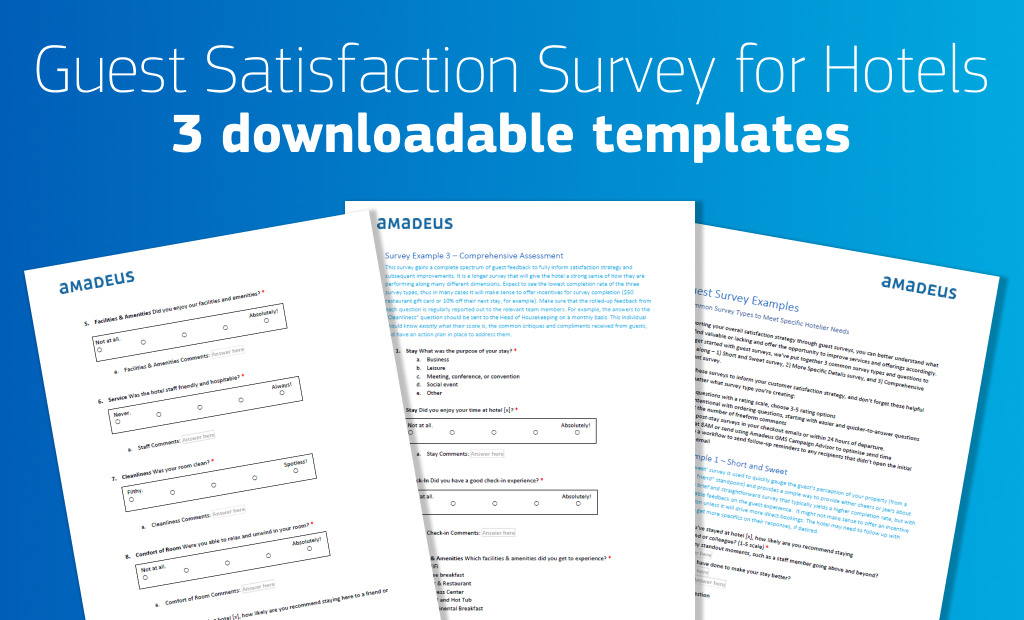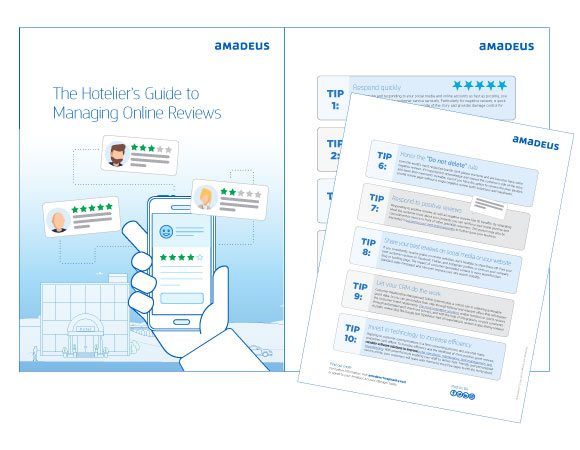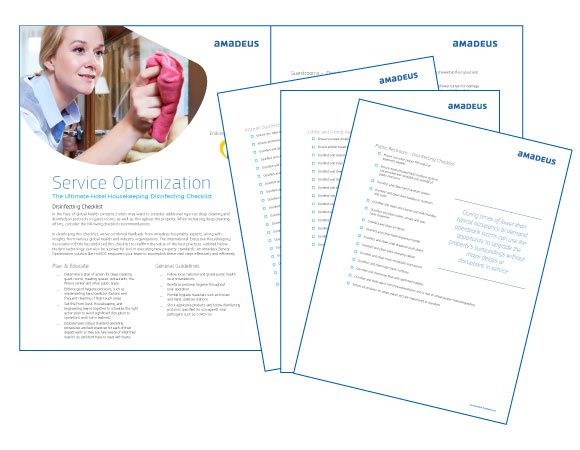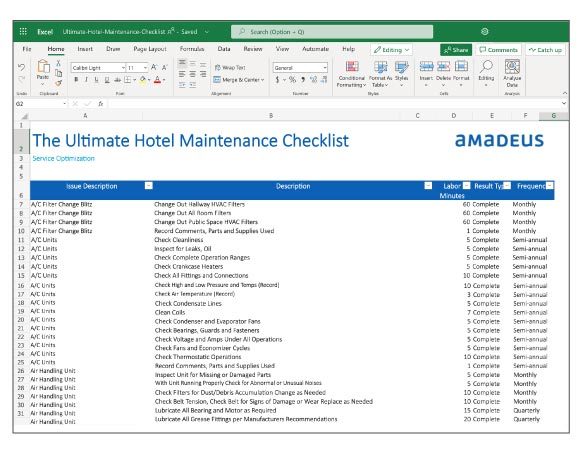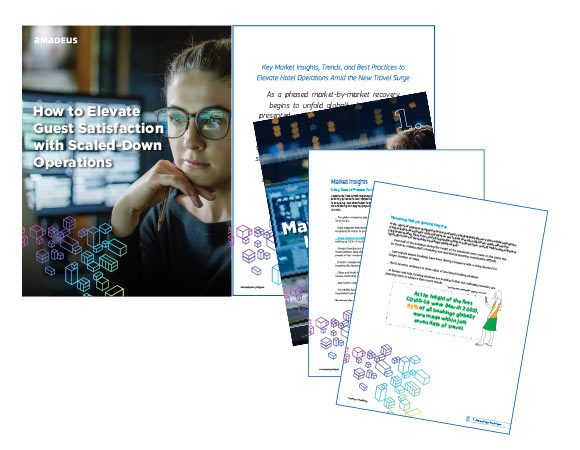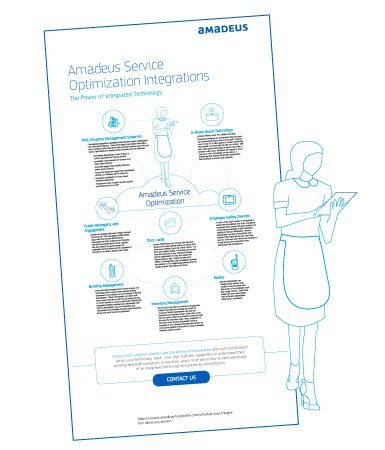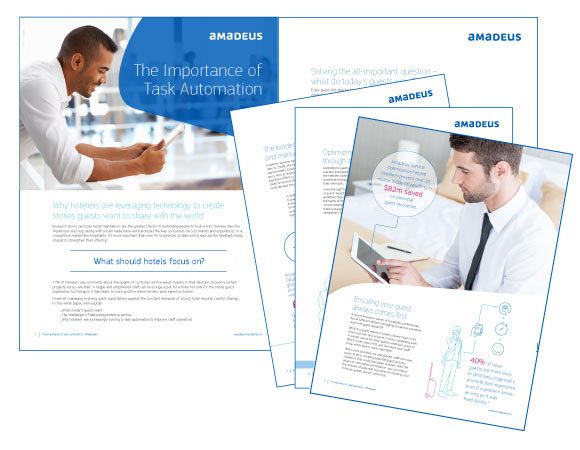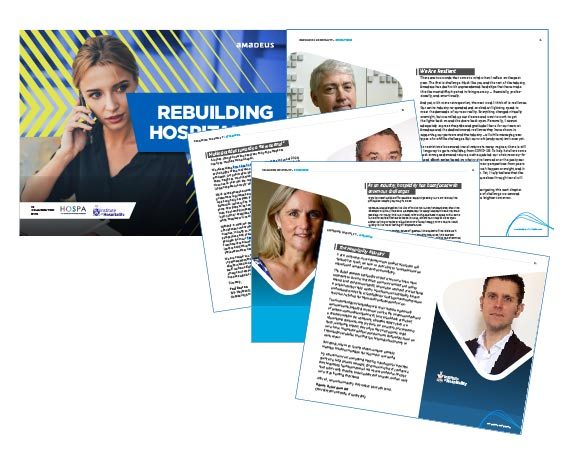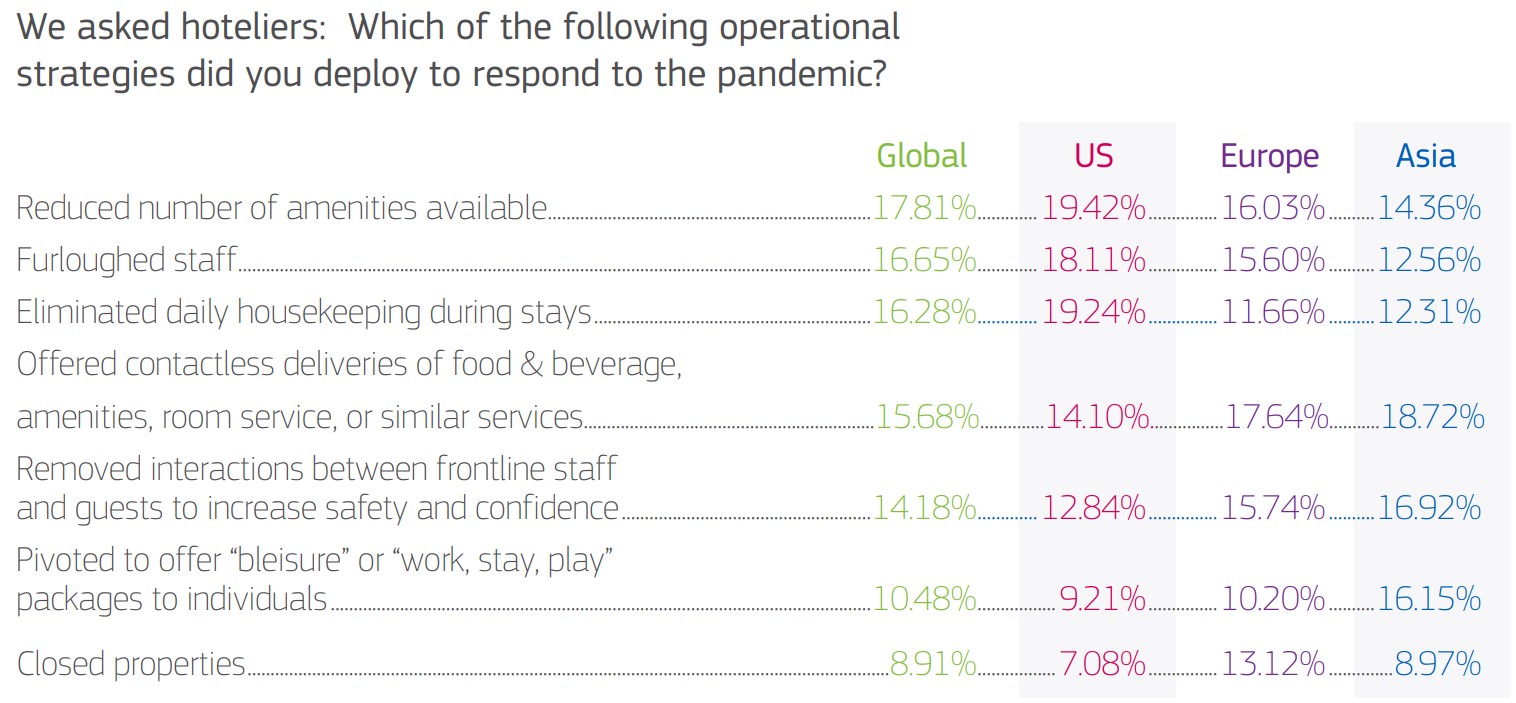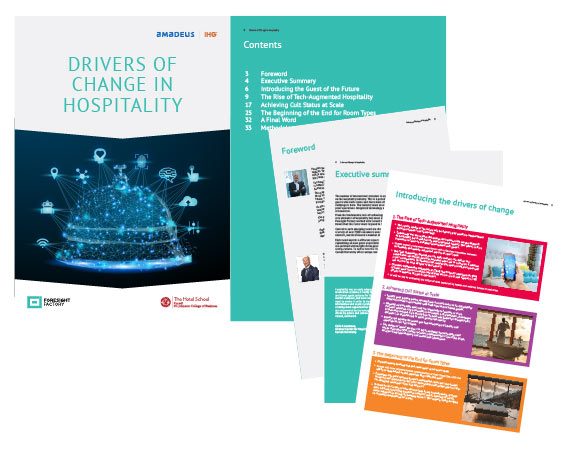INCREASE OPERATIONAL EFFICIENCY
The ultimate guide to elevating guest satisfaction
When it comes to the hotel experience, elevating guest satisfaction is the ultimate goal. But in reality, this is much more complex than it sounds.
Hoteliers are faced with figuring out how to put guests first, while juggling operational challenges, budget, and labor shortages.
If you’re a hotel manager looking for ways to improve service and ensure optimal guest satisfaction, this is the guide is for you.
We’ll provide an all-encompassing rundown of hotel operations including an explanation of why guest satisfaction is important, how to achieve guest satisfaction, and top strategies you can start implementing today that will make a true difference in your guest experience.
We hope you enjoy our ultimate guide to elevating guest satisfaction!
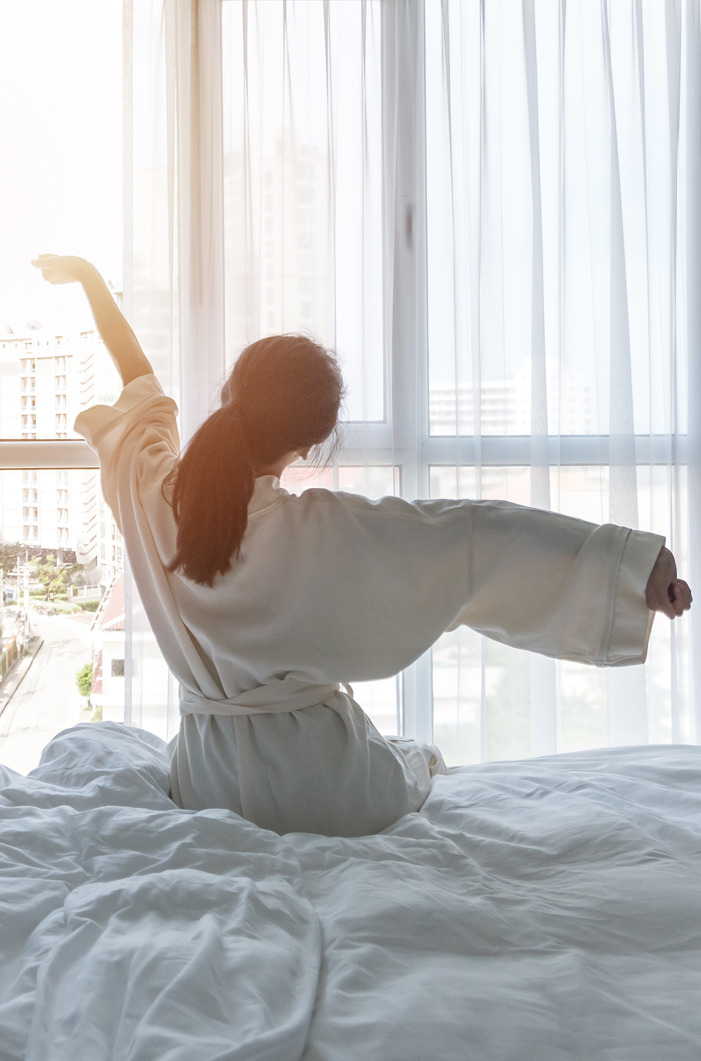
Hotel guest satisfaction
Hotel guest satisfaction
What is hotel guest satisfaction?
Guest satisfaction refers to the experience your guests have in your establishment, represented by the fulfilment of your guest's wishes, expectations, and needs, or the pleasure derived from this.
Guest satisfaction is also measured by the service offered in your hotel in comparison to the competition. You can gauge and optimize your performance constantly and measure it in a precise manner by collecting feedback.
Unsatisfied visitors may file complaints with the hotel, leave bad reviews online, and, ultimately, damage the hotel’s reputation. This can end up negatively impacting your bottom line, and fewer guests can also make it harder to provide the services that would ensure guest satisfaction.
On the other hand, happy guests are more likely to make repeat bookings and recommend your hotel to others, which positively impacts future growth.
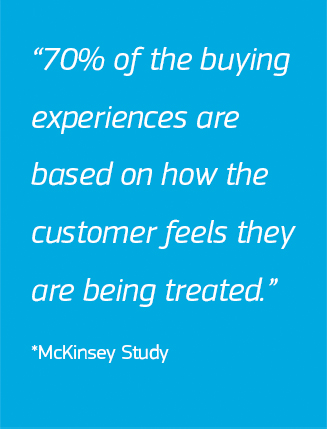
Source: Study by McKinsey
Hotel guest satisfaction
How guest satisfaction impacts hotel reviews
Online reviews are now one of the most influential demand drivers for the hotel industry. More and more travelers are sharing information, pictures, and details about their personal experiences on sites that can make or break decisions for others looking to book.
With sites like TripAdvisor, Yelp, and Google, it has become the norm to share reviews publicly. Smartphones have increased this trend, and travelers are now sharing their feedback before, during, and after their stay.
In an Amadeus study, 50% of travelers polled say they rely on advice from friends and family, while 49% use social media to learn more about their next destination. Peer-to-peer reviews are now becoming the most influential reason why customers choose one hotel over another.
To explore this further, Amadeus sat down with No Vacancy’s Glenn Haussman to talk about why peer-to-peer reviews are so powerful and motivational for the hotel industry. The conversation revealed that people value other’s opinions so much because they trust travelers that share their own personal experiences more than a hotel’s advertising.
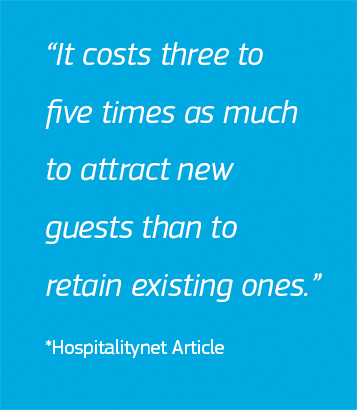
Source: Hospitality Net
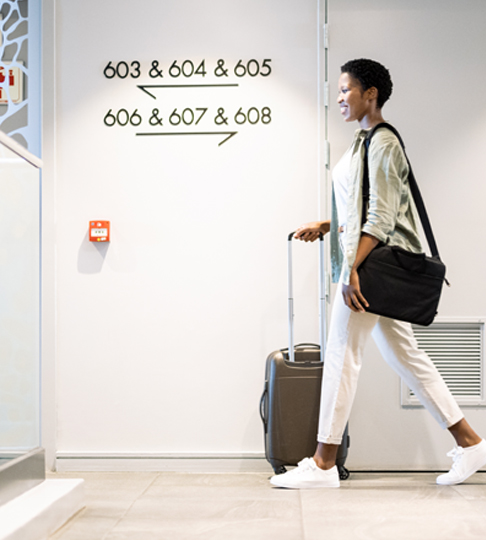
Hotel guest satisfaction
Why is guest satisfaction important?
The guest experience lies at the heart of hospitality and is a major driver of loyalty and personal recommendations.
Hotels face rapidly changing guest behaviors, preferences, and expectations. Properties that are able to deliver a memorable experience through unique amenities, personal touches, and stellar customer service will be rewarded with repeat business, word-of-mouth referrals, and positive reviews on social media.
COVID-19 has also brought housekeeping to center stage by accelerating change in our industry. It has reminded us how critical the housekeeping department’s role is to a hotel’s overall success. Here are best practices to follow to reset hotel housekeeping amid Covid-19 and beyond.
Peer-to-peer reviews have also become so important to travelers in the hotel shopping process, that it now impacts every property’s bottom line. What’s being said about your property is more important than ever before, and your operations team takes center stage in your brand’s reputation among your guests.
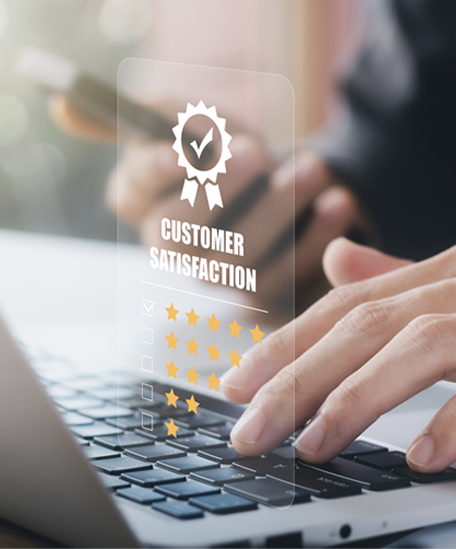
Hotel guest satisfaction
Top factors influencing guest satisfaction
Dirty rooms, slow housekeeping response times, lack of staff friendliness, and long check-in waits are all examples of negative experiences that ultimately hurts the guest experience.

Deloitte recently examined guest satisfaction on key experience factors in a hotel stay. Their survey confirmed a series of well-acknowledged industry “truths.” But it also revealed some areas where guest expectations have evolved that, if harnessed, can prove to be differentiators in the hospitality guest experience:
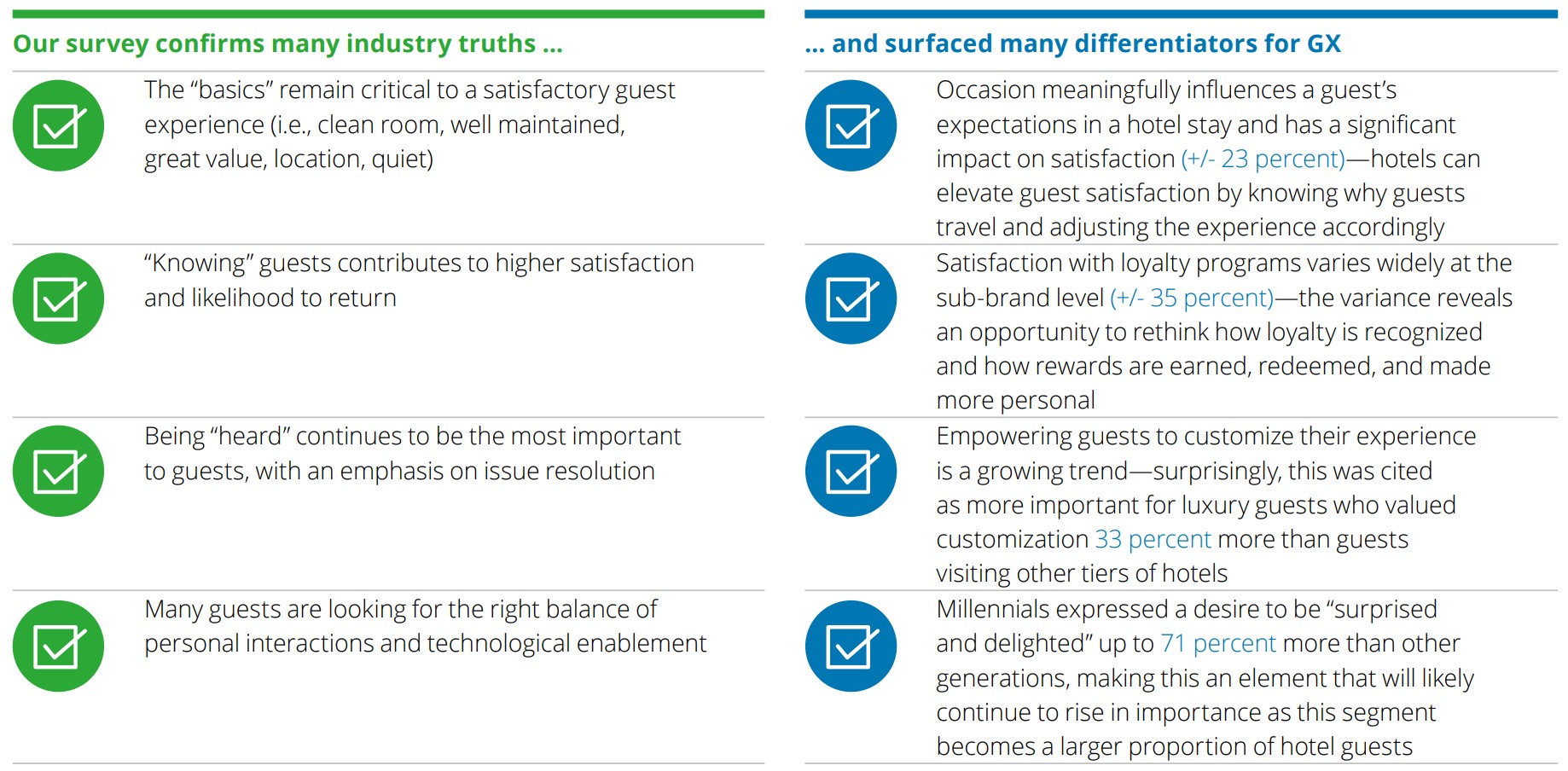
Deloitte study: Next-gen hotel guests have checked in | The changing guest experience
Hotel guest satisfaction tips and best practices
Hotel guest satisfaction tips and best practices
Properties that are able to deliver a memorable experience through unique amenities, personal touches, and stellar customer service will be rewarded with repeat business, word-of-mouth referrals, and positive reviews on social media. If you’re looking for ways to improve hotel guest satisfaction at your property, consider these eight proven strategies.
Hotel guest satisfaction best practices
Personalize the guest experience
It is highly recommended to leverage your CRS, CRM and SO platforms to understand how customers behave and experience your services based on the context of their travel. This in turn can allow you to proactively send targeted promotions or fine-tune upselling offers.
Beyond systems, other ways to provide a unique guest experience could be to leave a small welcome gift in each room, offer free refreshments in the lobby, and empower your staff to provide superior service.
For instance, if you have a couple that is celebrating their anniversary at your hotel, consider leaving a bottle of champagne or chocolate covered strawberries for them upon arrival. It’s a small gesture that they will surely remember and appreciate.
Hotel guest satisfaction best practices
Post-booking guest communications
Establish a connection with the guest as soon as possible with a follow-up email. This will allow you to set the tone for the guest’s stay and help you gather valuable information about them before they even step foot on your property.
Offer simple but thoughtful services such as extra pillows or dinner reservations. This is a great way to build more complete guest profiles, show your commitment to customer service, and even reinforce your brand promise and reputation.
Hotel guest satisfaction best practices
Offer guests freebies and complimentary services
Providing guests with a little extra, by offering a few services for free, can help endear guests to you and your brand.
Offering complimentary services is an effective strategy for providing customer service that guests will go home and tell their friends about — or better yet, share on social media.
It can be as simple as offering free spa passes or a free shuttle to the airport or to local attractions.
Hotel guest satisfaction best practices
Implement hotel in-room technology
The technology being developed for hotels today is truly cutting edge. For example, properties have the option to install “smart room keys” that allow guests to open their room doors with a simple swipe of their smartphone. Brands such as Sheraton and Hilton have already implemented this technology across the country.
Tablets are proving to be an effective communication tool for guests and staff. From their room, travelers can make a request in just a few clicks that is routed to a staff member’s mobile device and answered in a matter of minutes. The hotel can even program the tablets to promote paid amenities or local attractions.
Hotel guest satisfaction best practices
Be proactive in your hotel service
Rather than waiting for a customer complaint, it is recommended to move from a reactive to a proactive service model that improves customer satisfaction and retention.
For example, service optimization software lets you pull a report of every guest due to arrive on a particular day. If a guest has stayed with you before, or if you have gathered information during booking, you can use that information to personalize their experience.
Did they have an issue previously that you could make up for during this stay, perhaps by upgrading their room type? Or did they mention they were traveling with children, giving you the opportunity to leave a few toys or treats in their room prior to their arrival?
Hotel guest satisfaction best practices
Reward repeat guests
Building customer loyalty is important to any hotel’s success, and yet in today’s competitive market loyalty is becoming harder and harder to maintain. That’s why it’s so important for hoteliers to focus on strategies that recognize and reward repeat guests.
While loyalty programs are a great approach it’s important to consider how you design your program. Many loyalty programs offer a free night or a discounted stay after a certain number of points are accrued.
The problem with this approach is that it often takes a long time for a person to cash a reward. So, mix up your offerings. In addition to the free nights add in rewards that can be immediately redeemed, such as a free drink at the bar, complimentary valet, late check-out or automatic room upgrade.
It’s also important to recognize your guests by name when they arrive at your property, acknowledging that they are repeat guests and that you appreciate their loyalty.
Hotel guest satisfaction best practices
Offer multiple guest communication channels
Most travelers today show interest in using smartphones to request service and message hotel staff. Leveraging messaging technology and system integrations to deliver a better guest experience can be greatly beneficial for both the guests and hotel.
This is a win-win situation as guests get faster and more personalized service while hotels maximize operating efficiencies and workflows to conserve resources and reduce costs.
By leveraging guest information from a PMS or CRM system, hotel staff can send personalized text messages based on guest profiles and use that data to automate messages. This can help hotel staff better serve guests through more individualized communication.
Text and voice are already revolutionizing domestic technology, from mobile devices to kitchen devices to cars. Now it’s impacting the hospitality industry by allowing for a better and more flexible guest experience, from small requests such as towels to event attendees asking for program details.
Hotel guest satisfaction best practices
Create an inclusive and accessible experience for all guests
World demographic indicators show a growing, aging population, with the proportion of the world's population over 60 years nearly doubling from 12% to 22% by 2050 (World Health Organization data).
For hoteliers, it’s important to consider not just how your property is configured to accommodate disabilities, but how your processes and customer service strategies are designed as well.
In this context, technology is key in creating a truly inclusive strategy that makes travel accessible for everyone.
The travel industry is moving forward, developing mobile apps with accessible travel search engines, boarding passes in accessible formats and collating user-generated content on accessibility (through reviews and complaints.
Some hospitality companies have started to incorporate artificial intelligence assistance for voice-operated travel bookings. Mobile apps allow guests access to their rooms and other facilities, and virtual reality technology can help demonstrate accommodations and services.
Heightened hotel cleanliness standards & requirements
Heightened hotel cleanliness standards & requirements
Today, more hotels are welcoming back guests who are ready for a change of scenery. While price remains a high priority for consumers, we can expect them to focus just as much on a hotel’s commitment to its cleaning initiatives to reset hotel housekeeping.
Hotels that best meet heightened guest expectations for cleanliness protocols — as highlighted during the shopping experience and evidenced during their stay — will be best positioned to take advantage of demand as the industry rebounds.
Hotel cleanliness standards & requirements
The importance of hotel cleanliness today
The rise of the “Generation Clean” traveler – a new travel segment valuing cleanliness protocols above all else – reinforces the importance of housekeeping today, with health and safety ranking as the #1 priority for travel comfort post-COVID.
Winning the confidence of “Generation Clean” will require a thoughtful examination of current business processes to prioritize the wellness of staff and guests through social distancing and thorough sanitization, while maintaining the core of the experience customers know and love.
These heightened cleanliness expectations may also influence shopping and booking decisions. Therefore, evolving operating procedures to address health and safety concerns from both staff and guests will be crucial.
“We have to think outside the box. We have to put on hold what was ‘normal’ and create a ‘new normal’ that still delivers the high standards and enjoyable experiences that we once knew.”
– Peter Ducker FIH, Chief Executive, IoH
Hotel cleanliness standards & requirements
How to address heightened hotel cleanliness expectations?
Be sure to reinforce your hotel’s cleanliness commitment to guests and stakeholders at every chance possible with open, honest dialogue. Planning for health and safety now – while building a level of trust with guests – will pave the way for building brand equity and guest loyalty tomorrow. Here are 5 Steps to Enhancing Hotel Housekeeping & Guest Satisfaction in a downturn.
Hotels face an enormous responsibility to mitigate hotel hygiene and cleanliness concerns as demand returns, placing increased pressure on properties to respond despite limited staff and budget. In this context, the use of housekeeping checklist or Amadeus’ disinfecting checklist, endorsed by the International Executive Housekeeping Association (IEHA), can help meet today’s standards and ensure nothing gets missed.
As guests now expect the highest standards of sanitization to feel comfortable in a hotel, operators worldwide need to work with their housekeeping teams to better prepare for the impact of these new realities. By using this time to analyze hotel housekeeping practices, hotel leaders have an opportunity to take advantage of automation tools to more accurately plan for operational shifts that have the power to influence bottom-line results.
“Generation Clean” will continue to be a driving force along the evolving traveler journey in the post-COVID world. Once the market rebounds, hotels that best meet new guest expectations for scrupulous standards of cleanliness – and live up to delivering on those commitments – will be best positioned to take advantage of emerging demand.
The Ultimate Hotel Housekeeping COVID-19 Checklist
Ensure you:
- meet the new, elevated cleanliness guest expectations
- guarantee spotless rooms & well-stocked with amenities
- are up-to-date with cleaning best practices and standards
Hotel cleanliness standards & requirements
Hotel guest health and safety action plan
To win business in a climate in which the safety and wellbeing of both staff and guests are critical, you’ll need to make sure you are doing everything possible to minimize health risks and maximize how you communicate that beyond your front doors. Here’s how:
- Determine a cleaning plan of action and create a checklist for deep-cleaning hotel rooms, meeting spaces, restaurants, as well as the fitness center, pool, and other public areas.
- Get the front desk, housekeeping, and engineering teams aligned to avoid significant disruption to operations and room readiness.
- Schedule regular reminders for filters and ventilation systems to ensure optimal air quality.
- Plan for health checks on equipment and meter readings, while reconfirming maintenance and housekeeping checklists meet the evolving standards of today. From public areas and outlets to guestrooms and back of house, reviewing standard operating procedures can help to reduce costs and mitigate risk.
- Make sure all team members are empowered to flag areas of concern and have the tools they need or a common space to log the information, so nothing gets left behind
- COVID-19 has brought hotel housekeeping to center stage and and all initiatives to reduce the potential spread of germs and viruses should be considered. It is important your hotel remains vigilant in its commitment to cleanliness.
- Lack of planning for this additional time can cause strain on staff, while last minute modifications to departure room schedules can impact room readiness. By tracking and analyzing the resources needed to execute the tasks these rooms now require, hotels can adjust to new cleaning schedules, while identifying valuable areas for improvement.
- Clearly communicate your service and cleaning protocols with your guests in pre-stay, on-property, and post-stay communications.
Servicing guests and managing hotel operations will require more focus than ever before. Whether full service, luxury, or select service, properties that rethink the guest experience to meet the needs of the new traveler best, while incorporating a higher standard of cleanliness into their core values, will have the ability to attract a new generation of loyal guests.
Hotel maintenance best practices
Hotel maintenance best practices
Hotel maintenance is one of the crucial aspects of a hotel as it envolves all the tasks and work related to keep, restore, or improve all components of hotel building facilities.
Hotel maintenance ensures all the general building-related operations such as HVAC, electrical, and plumbing, furniture, ventilation, filters, sanitation technology, and that all infrastructure needs specific to hotels run as smooth as possible by reducing the risk of interruptions in running a hotel.
Hotel maintenance best practices
Why is hotel maintenance important?
When communicating with guests, be sure to share the proactive and enhanced preventative maintenance measures your hotel is taking. Promoting healthy hygiene practices in light of COVID-19 will not only put your guests at ease and gain their trust, but likely become the number one most influential factor in the hotel booking cycle for the foreseeable future.
Maximizing the value and health of your hotel’s infrastructure will be essential in facilitating any short and long-term planning as well. In protecting your building’s assets, it is recommended to formulate a plan to zero-in on the best practices for your hotel’s current, ongoing, and future state of business.
For example, it is important to schedule regular reminders for filters and ventilation systems to ensure optimal air quality. Plan for health checks on equipment and meter readings while reconfirming hotel maintenance checklists to meet the evolving standards of today.
The Ultimate Hotel Maintenance Checklist
Ensure your property:
- maximizes the well-being of your staff and guests
- maintenance tasks are on-track and well executed
- is up-to-date with the latest health integrity norms
Hotel maintenance best practices
Suggested hotel maintenance guidelines
Following the pandemic, it’s important to go beyond your hotel’s standard maintenance plan and automate processes.
Your hotel should begin to focus on performing more proactive maintenance to protect your assets and meet new requirements. Even with limited resources and minimal team operations, there are many tasks that require timely attention.
Read our article to find out more on applying the 3Cs of Hotel Crisis Management – Concern, Control & Commitment to address immediate safety-related concerns and lessen the impact on your infrastructure, while increasing guest satisfaction.
After all, a strong guest experience can’t happen without clearly defined cleanliness, security, and operational procedures.
From public areas and outlets to guestrooms and back of house, reviewing standard operating procedures around the hotel’s entire organization can help to reduce costs and mitigate risk.
Building a more satisfied, engaged hotel staff
Building a more satisfied, engaged hotel staff
As global restrictions ease and hotels begin to reopen, the outlook for leisure travel is increasingly optimistic. Yet as demand grows, so does the need to improve operational efficiencies.
Building a more satisfied, engaged hotel staff
Hotel labor shortages
A surge in hotel bookings and elevated guest expectations, combined with limited staff due to labor shortages presents new challenges that threaten the hospitality industry’s potential for an accelerated recovery.
A pandemic-related shortage of workers also threatens our global industry’s potential for success, as travelers arrive to properties with elevated expectations and a critical eye, sharply attuned to imperfections.
Turnover can impact everything from staff morale and a property’s ability to deliver consistent guest experiences, to budgeting, forecasting, and overall profit margins. To reduce it, building a more satisfied, engaged team and upskilling is key. Learn more in our article: How to reduce employee turnover at your property.
By considering the new trends shaping hotel operations and appropriately preparing teams to meet the new needs of travelers, we can begin to welcome back travel globally.
As demand and occupancy return, so does hotel maintenance, room cleaning, and guest requests. Faced with these challenges along with reduced staffing levels, hotels should consider tools to help orchestrate tasks such as automating room assignments, managing housekeeping opt-out programs, and proactively scheduling maintenance checks to help give limited time back to already scaled-down teams.
How to Elevate Guest Satisfaction with Scaled-Down Operations
- How to adress labor shortage implications
- Hotel market data to inform your strategies
- Tips for building a successful operations plan
Building a more satisfied, engaged hotel staff
Clustering hotel teams
Institutionalizing new cleaning measures and SOPs (standard operating procedures) in a short amount of time is no easy feat. But then trying to maintain those practices with reduced staff and labor shortages is an even greater challenge.
To help streamline, hotels with several properties may consider taking a centralized approach to organizing operations by clustering hotel teams. This would be done by creating groups of hotels and assigning key staff members to manage those hotels in a unified fashion.
For instance, call center activities for guest requests and room control could be centralized, as housekeeping and maintenance staff could share team members between properties. This could help hotels do more with fewer staff, while overcoming some of the immediate challenges as we work towards recovery.
Building a more satisfied, engaged hotel staff
Hotel staff safety
Moving forward, hotels will have to analyze data of recurring guest requests to identify shifts needed in staff time or in-room amenity programs, while monitoring changes in booking patterns to avoid understaffing.
Developing a culture of safety at your hotel for your team can also contribute to less staff turnover, ensuring team members are happy, engaged, and more productive.
The number one piece of advice is to work closely with your staff to reassure their safety and support them. This will in turn also lead to increased guest loyalty amid COVID-19.
Instilling a sense of safety by training on best practices for risk mitigation and implementing staff safety devices will also be key, while ensuring safeguards and appropriate PPE are in place for specific departments and tasks at hand.
Personal safety is also a key aspect of the guest stay, so make sure you put the spotlight on safety at your hotel.
Maximizing technology to improve the guest experience
Maximizing technology to improve the guest experience
New technologies and digital innovations that improve guest satisfaction and generate memorable guest experiences are ushering a new era for hotels.
In this section we will understand how hotel technology can benefit your hotel business by improving the hotel guest experience.
Maximizing technology to improve the guest experience
Hospitality is a human business
The core of hospitality is and always will be about its people. But the reality is the world’s digitization is accelerating at a rapid rate, meaning technology that was once complementary may now be essential.
Incorporating digitalization and automation into everyday practices gives hoteliers the opportunity to amplify team capabilities, driving focus to what’s truly important – the guests.
Your housekeeping team takes a center stage in your brand’s reputation amongst your guests and typically, has the most opportunities to interact with them. But unfortunately, they lack the time to do so because their manual operations take up too much time.
Maximizing technology to improve the guest experience
Hotel automation technology to augment personal interactions
In order for teams to efficiently balance their day, execute work, and deliver meaningful interactions to guests, they need that valuable time to be more anticipatory and engaging. In a people-first industry, finding a balance between high-tech and high-touch has the potential to have a profound effect on the guest experience.
New trends in hotel automation and guest personalization offer fresh hope for hospitality professionals to face the elevated guest expectations and prepare for the new world of travel. To elevate guest satisfaction more and more hotels are prioritizing investment in task automation technology to remove any barriers built by using manual operations.
If daily room cleaning is a must to maintain a property’s brand promise or star rating, automation technology that streamlines operations and improves staff productivity will be key to address cleaning or maintenance tasks promptly.
For properties both big and small, staff-facing technology like service optimization solutions are critical for hoteliers that will be forced to do “more with less” for the foreseeable future.
Technology can be used to optimize processes which can lead to more efficient prioritization of work for staff, as well as an improved guest experience. You can download our eBook to learn more: Questions to ask when considering automation for hotel operations.
The Power of Integrated Hotel Technology
Download this infografic to learn how to:
- leverage integrated hotel solutions to improve hotel operations
- use new hospitality technologies like voice assistants, door locks, and Bluetooth
- implement guest personalization, automation and proactive service
Maximizing technology to improve the guest experience
Digital transformation in hotel operations
As hotels around the world contemplate the implications of evolving changes in personal behaviors due to COVID-19, they are faced with the challenge of how to best service guests and manage hotel operations.
Travelers are now expecting rapid response times when it comes to service, as well as having their needs met without touching in-room equipment or being face-to-face with staff.
Rapid advancements in hospitality technologies like voice assistants, door locks, and Bluetooth low energy systems have also unlocked new ways for hoteliers to offer contactless experiences.
Moreover, the stronger the connection between technologies and flow of data, the stronger your operation can become to work smarter and not harder. Check out our ‘Power of integrated hotel technology’ infographic to learn more.
Technology can really amplify your team’s capabilities and productivity, as well as streamline many of your property’s processes for bottom line results. This can be achieved by leveraging the power of hotel digital transformation to empower teams and win over your guests.
Having technology assist your teams in all phases of the guest experience—before, during, and post-stay—by ensuring that critical touchpoints along the guest journey will result in positive outcomes. In this context,
The Importance of Hotel Task Automation
In this whitepaper, we explain:
- what modern guests want today
- the challenges of delivering proactive service
- how task automation improves staff operations
Maximizing technology to improve the guest experience
An increasing contactless hotel experience
Properties are increasingly implementing more standard hotel contactless experiences that enhance guest satisfaction and operational efficiency. These now include digital room keys, mobile payments, and voice command technology. Not only do these offer conveniences for the guest, but it will increase their confidence to travel and make social distancing easier in the post Covid era.
In much the same way we’ve seen more contactless check-in options at the airport, digital, contactless, and chat-based hotel experiences at the property improve guest satisfaction
Higher levels of contactless experience through automation have been implemented by hotels during the pandemic: self-service options, destination experience platforms, and even ‘ghost kitchens’, where a third-party kitchen supplies a hotel that’s closed its own, have all boomed during the pandemic.
Yet with the number of contactless and staff enablement solutions on the market today, how do you decide which ones will bring the most value to your guests and your employees? Here are aspects to Consider When selecting technology to support guest interactions and staff safety.
Hoteliers that can use staff skills and technology in harmony will undoubtedly have a competitive edge in the new world of travel. From serving basic customer needs to executing highly personalized and anticipatory services, leveraging the right technology can make a world of difference in providing an exceptional stay and creating happy, returning guests.
Further embracing digital tools and considering operational actions based on a hybrid model of hotel contactless and personal guest engagement will also ease concerns and help guests once again embrace everything they love about travel.
The changing dynamics of guest satisfaction
The changing dynamics of guest satisfaction
While the hotel industry is keen to get back to ‘business-as-usual’ when the environment permits, it’s likely that some operational changes made during the pandemic will be permanent.
In this section we dive into the changing dynamics that will drive hotel guest satisfaction in the years to come.
The changing dynamics of guest satisfaction
How has the pandemic impacted hotel service?
It’s also highly likely that self-service check-in online, at lobby kiosks or through mobile apps, which can boost the guest experience and increase efficiency, will endure with the application of technology to streamline operations as a long-term objective.
With this in mind, we invite you to read the second edition of our best practices eBooks with current insights as part of our Rebuilding Hospitality initiative that includes feedback from hoteliers around the world, perspectives from hospitality industry leaders at HSMAI and other organizations, and insights drawn from the latest market data and travel trends.
Many hotels adjusted housekeeping protocols during the pandemic, including eliminating daily housekeeping and turndown services during stays, primarily as a means of minimizing guest contact but also as a result of scaled-down teams, labor shortages, and the increased time needed to service rooms.
Reflecting on some of the greatest challenges of COVID-19, we asked hoteliers: Which of the following operational strategies did you focus on in response to the pandemic?
eBook: Rebuilding Hospitality - Operations
- How to overcome reduced staff & labor shortage challenges
- Housekeeping in a “Generation Clean” era
- Maintenance & engineering best practices
- Recommended guest-facing operational technologies
The changing dynamics of guest satisfaction
Evolving guest behaviors
We have seen before that hotels face rapidly changing guest behaviors, preferences, and expectations. To adapt to these shifting guest behaviors, properties should look to deliver a memorable experience through unique amenities, personal touches, and stellar customer service.
Looking to the future, taking into account other changing trends will also be strategic. Hotels that address expectations of the new wellness-focused guest will be better positioned to attract bookings.
The more they strive to adjust to these new patterns, the more they are likely to be rewarded with repeat business, word-of-mouth referrals, and positive reviews on social media.
Finally, providing personalized hotel experiences for guests is also quickly becoming the focus of the hospitality industry as hoteliers adopt technology systems en masse to help aggregate and analyze consumer behavior.
Drivers of Change in Hospitality
In our largest hospitality study to date, we asked more than 7,000 travelers and industry experts to define the future of the industry:
- New guest expectations
- Augmented hospitality
- Cult followings
- Customized spaces
The changing dynamics of guest satisfaction
Top guest requests
As occupancy grows, so too does the need to improve operational efficiencies. Guests are now arriving to properties with elevated expectations when it comes to service, cleanliness, and rapid response times. As demand and occupancy return, so does hotel maintenance, room cleaning, and guest requests.
What are guests asking for?
- Bottled water
- Bath towels
- Blanket sets
- Pillows
- Rollaway bed
What is affecting their stay?
- Lighting
- TV
- HVAC issues
- Toilet clogged
- Room cleanliness issues
Faced with these challenges along with reduced staffing levels, hotels should consider tools to help orchestrate hotal tasks such as automating room assignments, managing housekeeping opt-out programs, and proactively scheduling maintenance checks to help give limited time back to already scaled-down teams.
What do guests care about today?
Hotel cleaning protocols rank as top priority for travel comfort in the post-COVID era. The new “Generation Clean” traveler values cleanliness protocols above all else. Operating standards for safety, security, and cleanliness will be subject to new, elevated expectations, and operational practices are going to have to change.
Ready, Set, Elevate Guest Satisfaction!
Ready, Set, Elevate Guest Satisfaction!
Rebuilding Hospitality together!
Amid the many challenges facing the travel industry, COVID-19 has presented an opportunity for hospitality to reemerge better, stronger. As travel continues to rebuild globally, hoteliers are taking the time to reevaluate the fundamentals of how they’ve historically operated and strategize new ways to scale-up guest satisfaction with scaled-down operations.
Fortunately, incorporating digitalization and automation into everyday practices can give hoteliers the opportunity to amplify team capabilities, driving focus to what’s truly important – the guests. Hoteliers that can best adapt to the new forces shaping operations will be the first to experience positive revenue impact.
By considering these actions on how to elevate guest satisfaction, and amplifying team’s capabilities with new technologies, hotels can find the balance needed to succeed in this new – and evolving – world of travel.
Discover how Amadeus Service Optimization solutions, including the new HotSOS experience, enable hoteliers to manage housekeeping, cleanliness, maintenance, and other vital operational tasks with efficiency—and how you can gain access special features and pricing for a limited time in support of hospitality recovery.
You can also access our other comprehensive guides for hoteliers:
- The hospitality market insights hub
- The ultimate guide to hotel Marketing
- The ultimate guide to increase guest loyalty
- The ultimate guide to grow hotel groups and events business
We wish you a lot of success in your guest satisfaction strategies and please do not hesitate to contact us if you would like to discuss how to elevate your guest satisfaction strategies.
